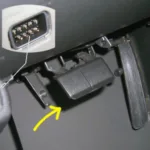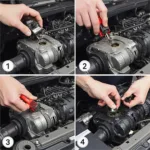Can you change OBD1 to OBD2? This is a common question among car enthusiasts looking to upgrade their vehicle’s diagnostics. Converting from OBD1 (On-Board Diagnostics 1) to OBD2 (On-Board Diagnostics 2) can be a complex process, but understanding the benefits and challenges involved can help you make an informed decision.
OBD2 offers significant advantages over its predecessor, including standardized diagnostic connectors, more comprehensive fault codes, and real-time data monitoring. These features make it easier to identify and fix vehicle issues, leading to improved performance, fuel efficiency, and reduced emissions. However, the conversion process itself can vary greatly depending on the make and model of your vehicle. Some vehicles may require extensive wiring modifications and the installation of new components, while others may be compatible with simpler adapter solutions. Knowing the specific requirements for your car is crucial before attempting a conversion. For example, you might be interested in OBD2 Prelude tuning after a successful conversion.
Understanding OBD1 and OBD2 Systems
Before delving into the conversion process, it’s important to understand the key differences between OBD1 and OBD2. OBD1 systems are generally manufacturer-specific, meaning the diagnostic connectors, fault codes, and procedures can vary significantly between different car brands. This lack of standardization can make troubleshooting more challenging. You can learn more about the differences in our article: what is the difference between obd1 and obd2 systems.
OBD2, on the other hand, was introduced in 1996 in the United States to standardize vehicle diagnostics. It features a universal 16-pin connector, standardized fault codes (DTCs), and consistent data output, making it much easier for mechanics and car owners to diagnose problems. This standardization is a key reason why many people consider converting their OBD1 vehicles to OBD2.
Is Converting OBD1 to OBD2 Possible?
Yes, converting from OBD1 to OBD2 is often possible, but the feasibility and complexity depend heavily on the specific vehicle. For some vehicles, especially older models, the conversion can be quite involved, requiring significant wiring modifications, ECU (Engine Control Unit) changes, and potentially the installation of new sensors. In other cases, particularly for vehicles manufactured in the transition period between the two systems, simpler adapter solutions might be available. These adapters allow you to connect an OBD2 scanner to an OBD1 vehicle’s diagnostic port, providing access to some OBD2 functionality. It’s essential to research your specific car model to determine the best course of action. For example, you might want to check if a 1988 GMC C1500 has an OBD2 before considering any conversion.
Factors to Consider Before Converting
Several factors influence the complexity and cost of an OBD1 to OBD2 conversion. These include:
- Vehicle Year, Make, and Model: Older vehicles typically require more extensive modifications.
- Availability of Conversion Kits: Pre-made conversion kits can simplify the process for certain models.
- Technical Expertise: Converting OBD1 to OBD2 requires a good understanding of automotive electronics.
- Budget: The cost can range from relatively inexpensive adapter solutions to more expensive full conversions. Consider your budget and the potential benefits before proceeding.
For instance, a 1994 Honda Civic EX OBD1 to OBD2 conversion might involve specific procedures and components. Knowing these specifics beforehand is essential.
Benefits of OBD2
The advantages of having an OBD2 system are numerous, including:
- Standardized Diagnostics: Simplified troubleshooting for mechanics and car owners.
- Enhanced Fault Code Information: More detailed DTCs provide specific insights into vehicle problems.
- Real-Time Data Monitoring: Access to live data streams allows for precise performance analysis.
- Improved Emission Control: OBD2 helps identify and address emission-related issues, contributing to a cleaner environment.
- Easier Tuning and Modifications: OBD2 allows for more precise tuning and modifications with the use of appropriate software and tools. You might be interested in exploring BMW tune with OBD2 options.
Conclusion: Making the Right Choice
Can you change OBD1 to OBD2? The answer is often yes, but the process and its complexity vary significantly. Weighing the benefits of OBD2 against the cost and effort involved is crucial. Thorough research on your specific vehicle and seeking professional advice if needed will help you determine the best approach. Remember to consider the long-term benefits of improved diagnostics, easier maintenance, and potentially enhanced performance when making your decision.
FAQs
- Is an OBD1 to OBD2 conversion always necessary? No, it depends on your needs and the capabilities of your vehicle’s existing system.
- Can I do the conversion myself? It’s possible, but requires technical expertise in automotive electronics.
- Where can I find conversion kits or adapters? Automotive parts suppliers and online retailers often carry these items.
- Will converting to OBD2 improve my car’s performance? Not directly, but it allows for easier tuning and diagnostics, which can indirectly improve performance.
- What are the common problems encountered during conversion? Wiring issues, incompatibility with certain ECUs, and difficulty finding the right components are common challenges.
- Is there a way to check if my car is OBD1 or OBD2 compatible? Checking the diagnostic connector and consulting the vehicle’s documentation are good starting points.
- How can I find more information about my specific car model’s conversion process? Online forums, automotive communities, and manufacturer websites can provide valuable insights.
Need further assistance? Contact us via WhatsApp: +1(641)206-8880 or Email: [email protected]. Our customer support team is available 24/7.

